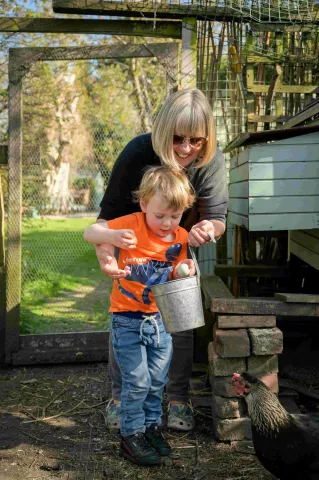How DLA care and mobility components work
Understand what entitlement to Disability Living Allowance for children is based upon, how the different rates work, and what you will need to show in your application to get the right amount of benefit.
This information applies in England and Wales. It will be helpful for claimants in Northern Ireland where the rules are the same. For Scotland’s Child Disability Payment, the rules are similar but not identical and there are additional groups of children who can qualify.
Last updated: March 2025

How DLA works
Whether or not your child is entitled to DLA is decided on how much more help they need than other children of their age, as a result of their disability or illness. This can be help that other children of their age don’t need (for example, if your 14 year old needs help with getting dressed), or help that children of their age do need but your child needs more help or it takes much longer (for example, if it takes you 30 minutes to get your 5 year old to brush their teeth, or if you have to spend long periods of time getting a 10 year old to settle to sleep). It doesn’t depend on their diagnosis and it doesn’t matter if they don’t yet have a diagnosis.
DLA has two components: the care component and the mobility component. You may get either or both.
Each component is paid at different rates. What rate you get for care depends on what additional help a child needs with things like eating, washing, dressing, learning, communicating, doing fun things, or sleeping, and how often.
What rate you get for mobility depends on their difficulty moving around or going out, compared to the needs of another child of a similar age.
The DLA mobility component
DLA has a ‘mobility component’ that deals with ability to walk and go places.
To get the high rate for mobility your child must:
- be at least 3 years of age, and
- be unable to walk or virtually unable to, or the exertion involved in walking would endanger their health, and this must have a physical cause, or
- have no feet, or
- be blind or severely visually impaired, or
- have a severe mental impairment and/or severe behavioural problems and also qualify for the highest rate of the care component.
The rules for this category are very strict and specific. If you are thinking of challenging a decision because you think your child is entitled to high rate mobility for reasons other than a physical inability to walk, we suggest you get advice if at all possible or look at Contact’s guide Claiming DLA higher rate mobility.
To get the lower rate for mobility you child must:
- be over the age of 5, and
- need substantially more supervision or help to go out than other children their age. For example, your child may need to be prevented from running into the road (when other children their age are aware of road dangers), or need extra prompting and encouragement to walk and keep walking. Note that if a child can manage familiar journeys without help, they can still get the lower rate of mobility for trouble with unfamiliar journeys.
The DLA care component
DLA also has a ‘care component’.
To get the higher rate for care, your child must needTo get the higher rate for care, your child must meet the ‘daytime’ and ‘night-time’ conditions or be terminally ill.
The daytime condition is that your child needs:
- substantially more practical help, encouragement or prompting with daily living tasks than another child of their age frequently throughout the day, or
- someone to supervise them throughout the day to keep them or other people safe.
The night-time condition is that you child needs:
- substantially more practical help, encouragement or prompting than another child for at least 20 minutes at night, or
- at least twice during the night, or
- someone to watch over them at night to keep them or other people safe.
To get the middle rate for care, they must meet either the daytime condition or the night-time condition.
To get the lower rate for care, they must need substantially more practical help, encouragement or prompting than other children of their age for at least one hour or more (in one go or spread throughout the day).
To count as needing help at night, your child needs to require a lot more help than another child of their age at a time when the rest of the household would usually be asleep. For example, if you usually go to bed from 11pm-7am (or would usually if you were able to), it would only count as ‘night’ if it happens between 11pm-7am. If you would usually be up, it doesn’t count even though it is after the child’s bedtime. However, if you have to stay up later or get up earlier than you would otherwise because of your child’s needs, this counts as night-time.
What the DWP look at
If the child or young person can do any of the things below on their own but it takes them a very long time, causes them pain, or may put them (or somebody else) in danger, the law sees this as needing help so you should include it on your form.
Do they have physical difficulties that affect their ability to walk places?
If they cannot walk even short distances without discomfort, or if they are very slow, explain this carefully as this could entitle them to the mobility component.
If they need help to walk around school for example, please explain what difficulty they have and what help they need.
If they are slower than their friends and need people to wait with or go slow, include that.
Do they need supervision, prompting or encouragement to walk places?
If they need more help than another child their age to go out and about, include that. This might be help to stay safe or encouragement, prompting, or soothing.
If they ever need restraining to keep them safe, over and above what another child their age needs, explain this.
Daily care
Next, look at the help they need in the home or at school. Do they need extra physical help, prompting, or encouragement to:
- Do they need more help with getting up or going to bed than others of the same age?
- Do they need more help with eating meals and snacks than others of the same age?
- Do they need more help with keeping themselves clean than others of the same age? This includes washing hands, brushing teeth, washing face, and having a bath or a shower.
- Do they need more help with going to the toilet than others of the same age?
- Do they need more help than other children their age to move about indoors?
- Do they need more help with dressing and undressing than others of the same age (including selecting appropriate clothing)?
- Do they need help to take their medication or manage any therapy? How often do they have to take it or do it? How long does it take to get them to do it properly?
- Do they need more help than others their age to speak, hear or read?
- Do they need more help than others of the same age to keep themselves and others safe?
- Do they need more help than others their age to have fun, take part in social activities, or enjoy hobbies? It doesn’t matter if they actually get this help, it is about what help they would need to do something reasonable, like go swimming or go to an after-school club.
- Do they need more help than others their age to play and learn, including taking part in PE, art or music?
- Do they need more help than others their age at school or nursery? It doesn’t matter if they actually get this help, it is about what help they need.
- Do they need more help than other children their age at night? This might be to stay in bed, go to the toilet, or calm down if they get distressed. Or it might be that they need supervision because of a health need or because they might get up and do something dangerous. Night-time is when you would otherwise be in bed. If they sleep in your bed because you cannot get them to stay in their bed for a reason connected to their disability, explain this, and what happens if you try to get them to stay in their bed.
During the night
Do they need help overnight - to stay in bed, go to the toilet, calm down if they get distressed, etc? Do they need this for either at least 20 minutes at night or at least two times?
If they sleep in your bed because you cannot get them to stay in their bed for a reason connected to their disability, that counts. Explain what happens if you try to get them to stay in their bed.
Do they need supervision because they get up and might do or have done dangerous things?
Danger
If the child has been hurt, or could have been hurt, as a result of their condition, say so on the application, mandatory reconsideration request, or appeal form. Perhaps they have fallen, had violent seizures, run out into the road without looking, self-harmed, or limited their food to a dangerous level.
If you are aware of a time when they have hurt or posed a danger to somebody else, say this too.
Help with medication or therapy
What help do they need to take their medication, or do their therapy, and how often they have to take it/do it?
Add this time into the amount of extra support time they need to deal with the tasks above. Does it add up to more than an hour extra a day (this would entitle you to the low rate of the care component), or frequent help throughout the day (which would entitle you to at least the middle rate of the care component).
Acknowledgements

Advicenow is grateful to the Ministry of Justice for funding the creation of this guide under the Online Support and Advice Grant.
Advicenow would like to thank everyone who provided advice and feedback on this guide.
Related content







